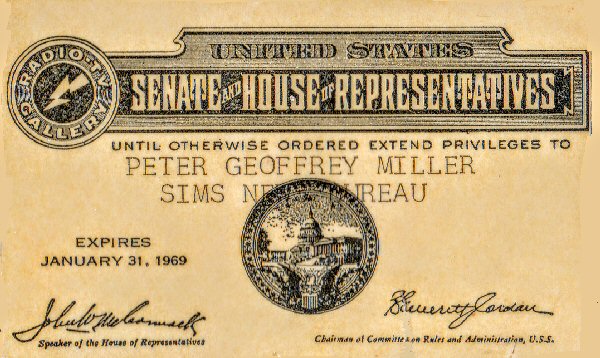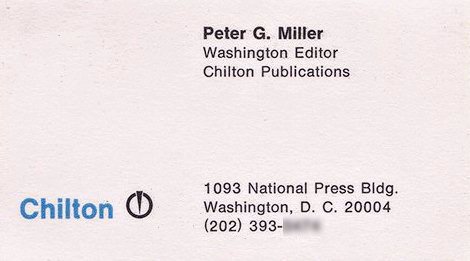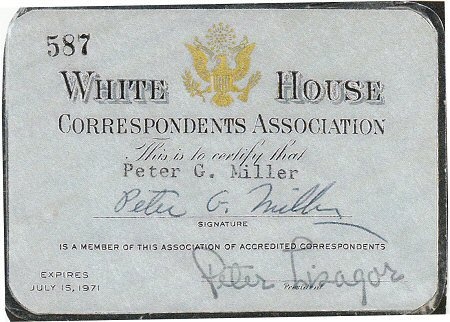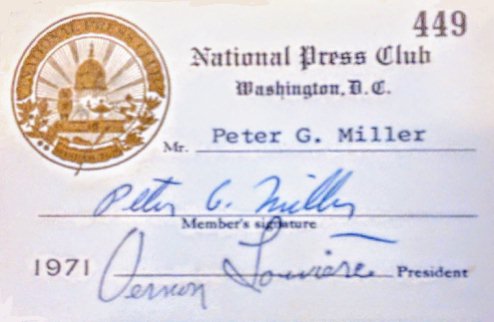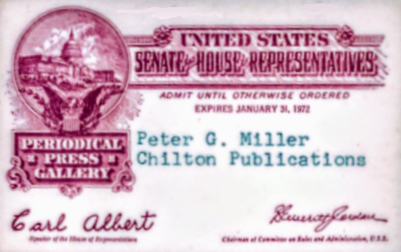How I Became A Successful Writer For More Than 50 Years
How can you become a successful writer? My answer began more than 50 years ago.
It was in 1968 when I got my first writing job. I was going to the American University in Washington, DC and there was a sign on the job board looking for a Capitol Hill correspondent. I was a journalism major, so I called. The guy at the other end told me to come down and bring writing samples.
The news bureau office was in the living room of a cramped Capitol Hill townhouse. The bureau chief looked at my samples from the student newspaper and magazines, looked at me, and said: “you’re hired.” I suddenly had a paying job and was immediately accepted into the Radio-TV Gallery of the House and Senate. I was officially a Capitol Hill correspondent.
It turned out the bureau chief was the only employee besides me. Two days later he quit. The owner called from South Carolina and asked if I could run the bureau. I said sure and became the chief of a Capitol Hill news bureau, the Sims News Bureau, that served seven radio stations and two newspapers in three states. I was 22.
You can’t be a bureau “chief” without a staff. That’s like being a general without an army. So I hired a college friend — Jeff Lubar — to work with me. When I went into the military, Jeff “moved up” and became the chief. He went on to become a successful radio correspondent and then did PR with major national associations. We were life-long friends.
A Touch Of Employment
I soon became a Washington editor with Chilton Publications, one of the three largest business magazine publishers at the time. Its offices were located in the National Press Building, and I became a member of the National Press Club a few floors above. I also became an accredited correspondent on Capitol Hill with the Periodical Press Gallery of the House and Senate, and a member of the White House Correspondents Association.
Chilton was a terrifically good place to work. There was a salary. There were benefits. I had my own office with a view of the Washington Monument and the Federal Triangle. I traveled across the country to report stories.
Chilton paid the tuition for the master’s degree I got at night. I had an expense account. Lunches with sources at great restaurants were encouraged. I worked with skilled editors and great writers, people I very much liked and admired. There was a company emphasis on quality. It was the era of the 9-to-5 job and people really left the building at five.
It was a dream job.
How To Start
I always had the urge to work on my own. My exit from Chilton was on good terms and with lots of notice. They offered a significant raise if I would stay. Nobody was angry with anyone.
I had saved money from Chilton and could go a few months without earning a dime but, otherwise, there was no safety net. I planned ahead. The day I became independent I had several clients in hand. My cash income rose! But what I didn’t have were benefits such as health insurance, vacations, or retirement.
My cost for Social Security went up because there was no employer in the picture. At the time, fortunately, I was young and health insurance was cheap, especially with a big deductible. I never had a claim. I was lucky. Today health insurance is expensive, so not as easy to afford.
To get business I took several steps.
First, I invested in business cards. I told everyone I knew I was available.
Second, I became visible. Meetings, parties, and events — formal or informal — I was there. Today I would be active on Facebook and other social media, plus I would go to every local meeting I could find. You never know who you will encounter.
The Keys To Being A Successful Writer
I see writing as a business. Some people do law or medicine, or plumbing, or teaching, or programming, or whatever. I do writing. I report, explain, and comment for editorial clients. For business clients, I position, explain, advocate, and ghost.
Being in business means you need a certain discipline. You must earn dollars. I took the money I earned and saved as much as possible every month. I bulked up savings because I knew clients could leave at any moment but expenses would continue. By age 27 I bought my first home.
During my career, I’ve had the opportunity to write books for Harper & Row, weekly columns for The Washington Post, articles for leading publications and online sites, and a nationally syndicated weekly column. Also, I’ve been able to work with major corporations and associations in various fields, meet interesting people, travel widely, and speak before various groups and organizations. Most importantly, I’ve had time to be with family and friends. There have certainly been ups and downs, but such things are part of life.
Strategies And Ideas For The Successful Writer
I grew my business in several ways.
- I looked for clients with ongoing needs. One-time assignments were to be avoided unless they might lead to a continuing relationship. I wanted business every month.
- I never missed deadlines. The reason is that other people need time to edit, layout, and promote. If I’m late there’s more pressure on them. Do they like that? Nope, not at all.
- Good work was always important. I wanted to do superior work, and to be seen at the top level of my profession. If this meant putting in more time or doing more research, that was fine. Doing the minimum is not enough.
- I had a dual-fee pricing system. When people ask what I charge, I always say I have two fees. First, there’s a cash charge for my work. Second, if I do a good job, I want contacts to introduce me to new clients. You have to ask for business.
- I worked when I was productive. My day generally began at 6 AM or 7 AM. It ended when it ended. There was usually no schedule and no requirement to be somewhere. As long as I had clients and was productive, I could arrange my time as I preferred.
And More
- I charged what the market would bear. When someone asks “What do you charge” my answer is “We need a fee arrangement which works within your budget. What’s good for you?” The answer is usually pretty reasonable. But, if not, you always have the right to say no. (Famously, there was the editor who said he was willing to pay between $5,000 and $6,000 for an assignment. I said, great, I’ll take $6,000. He just laughed – and became a good client.)
- I worked at home. One reason was to avoid downtown rents, but a bigger reason was to avoid wasting time. Time really is money. You don’t make money commuting, you lose money wasting time. Equally important, by working at home I could work any hour, day or night. Think about your work schedule and then calculate how many hours are actually productive. You likely can cut your “work” hours by the equivalent of a day or two per week — or more.
- I did business at restaurants. Out-of-town clients loved meeting at places that overlooked the White House or were filled with senators and representatives. So did local clients. Restaurants are neutral territory, not the client’s office or yours. There are few interruptions. People like to eat good food. It’s a good experience. Things get done. People will want to meet with you again.
And Still More
- I didn’t work with toxic clients. There are clients and contacts who will suck you dry with insane demands, poisonous reactions, and personal abuse. They’re not worth your time, no matter what your time is worth. Prize decent and ethical people. You’ll be happier, do better work, and be proud of the association.
- Money was important. The great value of money is that it gives you options, including the ability to say no, set your own schedule, and help others without charge. How much money is enough? We all have different answers.
- I brokered people. If I saw that Smith could help Jones, I would introduce them. In turn, people would often introduce me to potential clients.
- I “traveled” with contacts. A “client” might be a publication, corporation, advertising agency, PR firm, or association, but ultimately, you’re working with people. Those people – your contacts — sometimes change jobs. They might still need your services at the new job, someone they know and trust. The result is that I sometimes wound up with a new client when a contact changed jobs and kept the old one as well.
- I wanted multiple clients. That’s because clients turn over and I never want to be without an income stream.
- All clients ultimately leave. Why? Because times change. Even after 15 or 20 years, new contacts come in, goals evolve, and budgets are revised. It’s okay. You’re not a failure. When it’s time to leave, be gracious. Thank your contact. If you leave on good terms, the client may come back because you’re known. I’ve had a number of clients return.
Books
I try to keep the rights to my editorial work. It used to be easy to keep all rights but that’s no longer true with the advent of the Internet. Online publishers typically want at least some rights.
For example, I sold my first house without a real estate broker. I saved several thousand dollars, big money at the time. My attorney and I thought it was an idea that could be taught to others. We started an “institute” to teach classes. The classes were held in local hotels and became popular. They were covered in local newspapers.
One day an editor from The Washington Post called and said, hey, you’re a reporter, can you write a weekly consumer real estate column for us? Sure. Absolutely. I was able to keep the rights after publication. I had our arrangement in writing.
A bunch of those columns became the basis for the first of seven books I wrote for Harper & Row, books that sold more than 300,000 copies.
My relationship started with a two-page proposal to Harper for a mortgage book. I wasn’t sure it would go anywhere and then I received one of the best phone calls of my career. The phone rang, and a voice at the other end said, “Hi, my name is Aaron Asher. I’m the executive editor at Harper & Row. Would it be okay if we sent you a check as an advance on your book?”
I was amazed. According to The New York Times, Aaron’s writers included Saul Bellow, Philip Roth, Arthur Miller, Erich Fromm, Frank Conroy, Ronald Steel, and President Lyndon B. Johnson. These writers were at the top of the editorial mountain and I, obviously, had a very long way to go.
Terry Karten was my editor at Harper. She went on to become the Senior Vice President and Executive Editor, Harper Perennial, Harper. She was terrifically talented and I was delighted to work with her.
America Online
In the mid-1990s Home Office Computing magazine was an editorial client. I wrote a number of feature articles for them and one month there was an ad for a small online service based in Tyson’s Corner, VA. I called and asked if they had a real estate section. When they said “no,” I asked if I could meet with the company president or CEO and soon was having lunch at a nearby, circus-themed, deli with Steve Case. The little company had about 120,000 accounts when I became the creator and host of America’s Online’s Real Estate Desk, a real estate site that with the growth of AOL became one of the largest areas of its kind online.
“For the most part,” reported Inman News in 1996, “he is credited with legitimizing the on-line real estate world.”
Publicity Is Your Friend
Because of my books, I was on Oprah!, the Today Show, CNN, NPR, and many, many other media outlets. Harper sent me on one or two book tours a year for many years. That exposure resulted in a syndicated newspaper column, a column which at its height appeared in more than 125 papers nationwide.
Being published naturally lead to professional exposure. You don’t have to explain who you are or what you’ve done if your name appears in leading publications. Your byline is your resume.
Retirement
People sometimes ask, hey, when will you retire? I like what I do. I know more than when I started. It’s good to be involved in life. If something grabs my curiosity, that’s great. And if people will pay for my labors, if I’m good enough, that’s great also. Meanwhile, there are no stone tablets that say I can’t do other things, travel, or be with friends and family.
My goal is to follow in the footsteps of Herman Wouk, author of The Caine Mutiny, The Winds of War, and other exceptional books. He died ten days short of his 104th birthday — working on his latest project.
Consider this
Don’t be a writer. Be in the writing business. That leads to becoming a successful writer. If you’re good at what you do you should be well-paid for your efforts. Money is a necessity. It’s also recognition for the quality of your work. The Army has this right, be all you can be. You’ll feel good about yourself.
___________________
Photo Credit: Kaitlyn Baker on Unsplash
Copyright 2020 Peter G. Miller. All Rights Reserved. This material may not be re-posted without the express written permission of the author.


